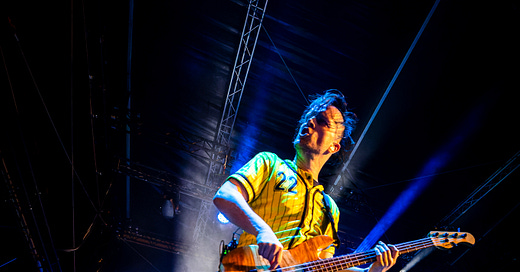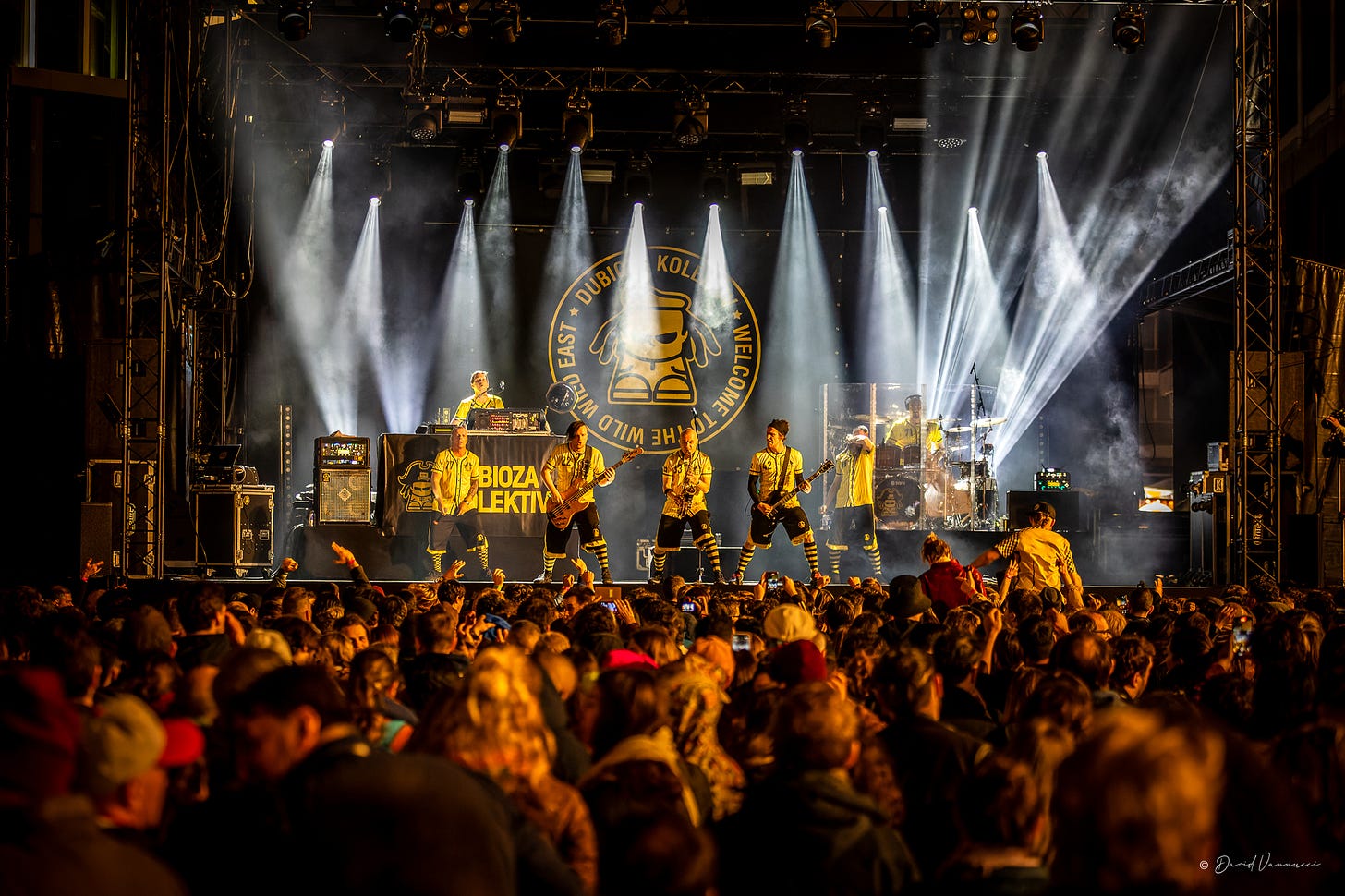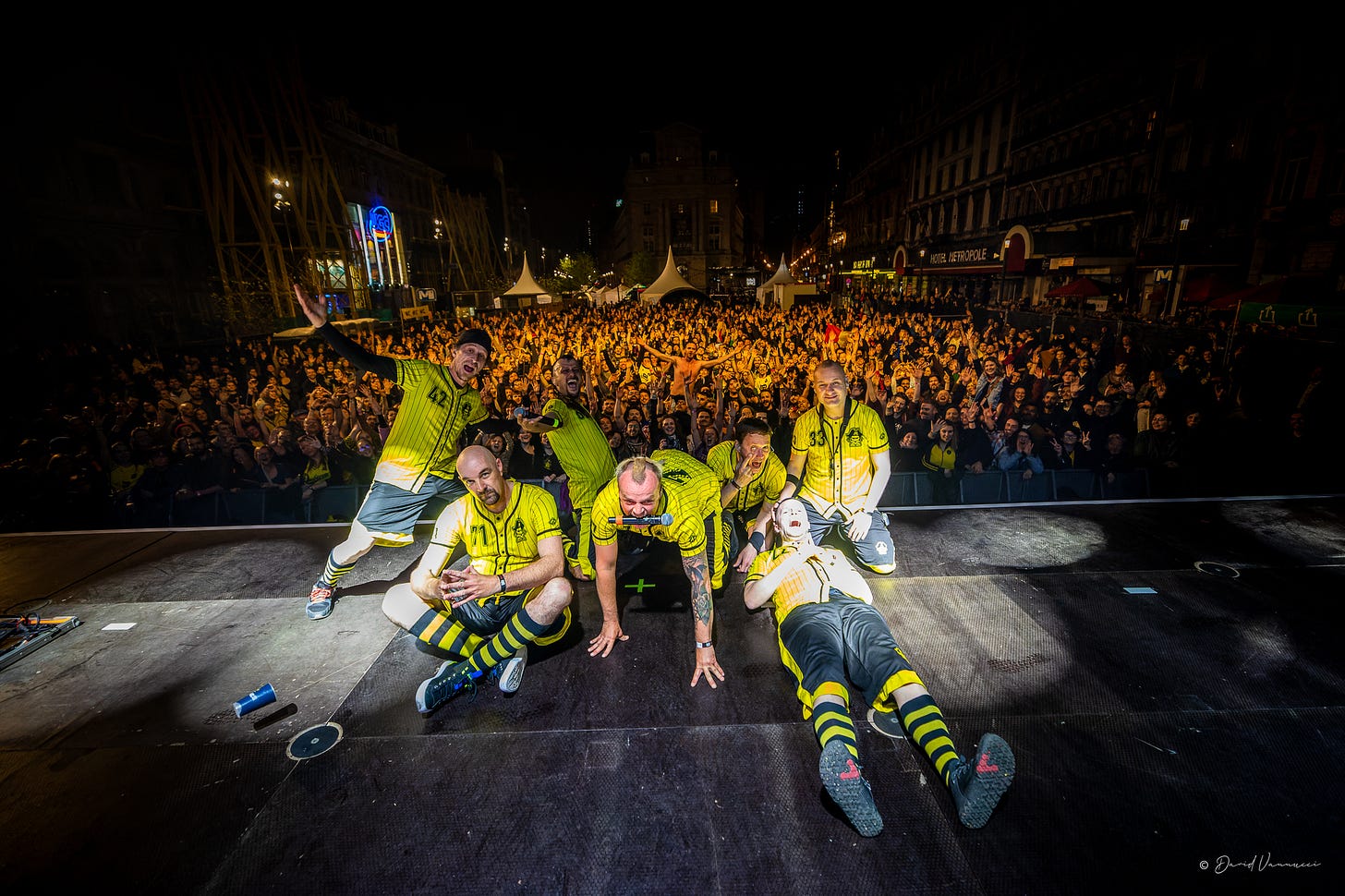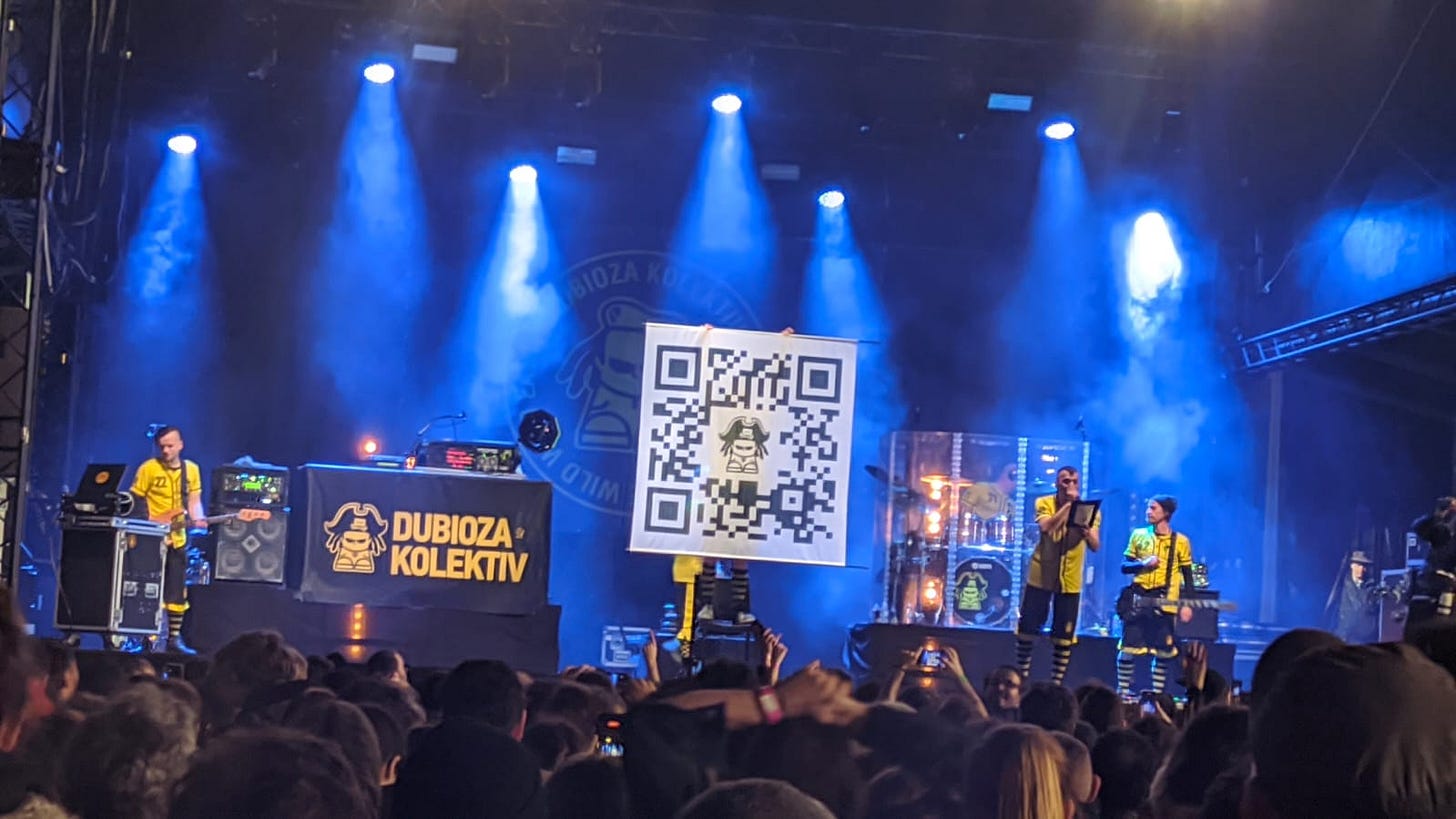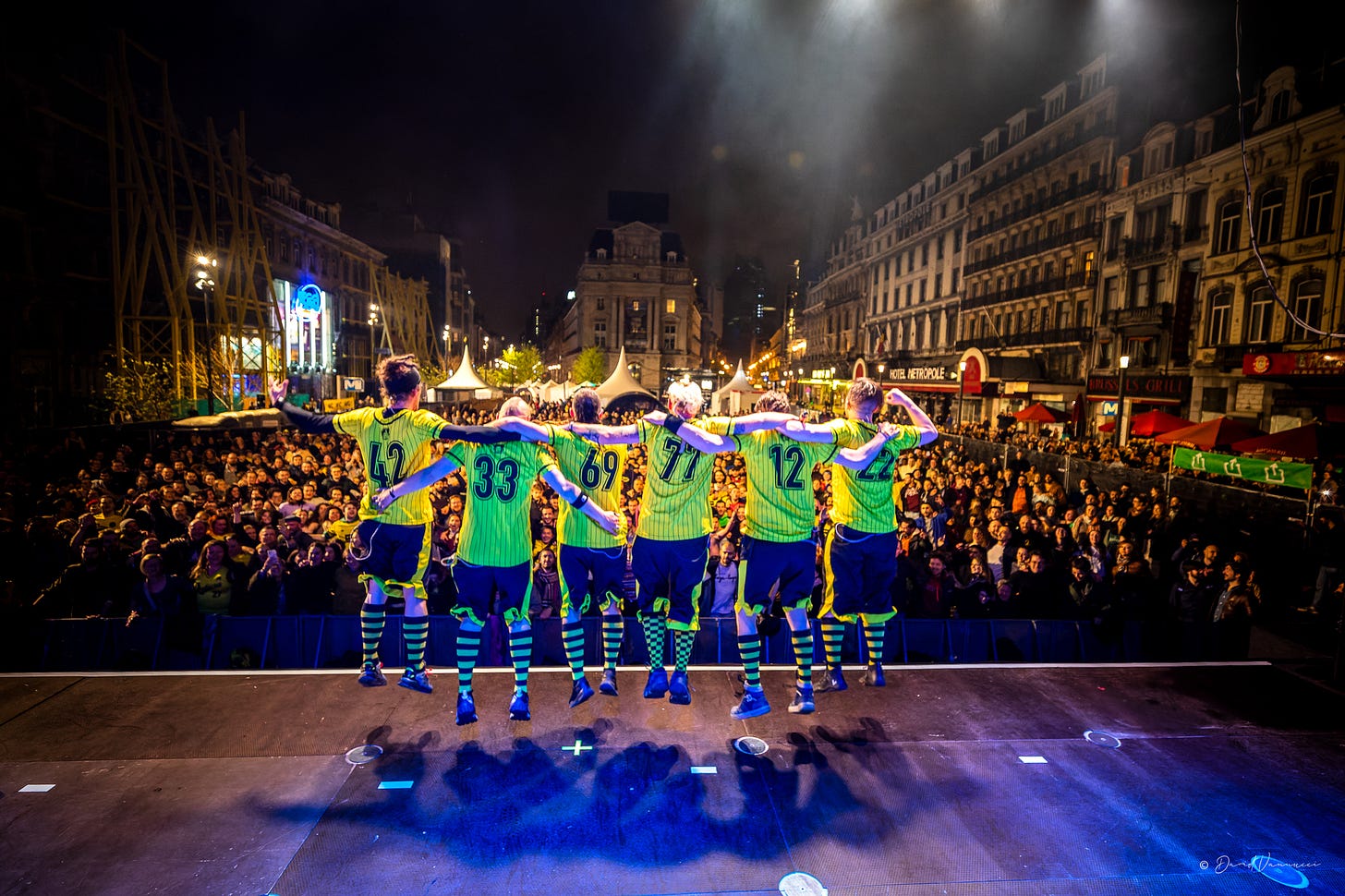Special edition - Dubioza kolektiv
Exclusive interview with Vedran Mujagić, bass player of the Bosnian group, at the backstage of the Balkan Trafik Festival in Brussels during their European tour. By Chiara Catelli and Walter Fiorini
Hi,
welcome back to BarBalkans, the newsletter (and website) with blurred boundaries.
This is a special edition, something absolutely new.
To make it short, thanks to the energy and the work of Chiara Catelli and Walter Fiorini, friends and collaborators of this newsletter, BarBalkans had the opportunity to interview Dubioza kolektiv.
This is one of the most famous Bosnian musical groups, with an eclectic style that ranges from rap rock to ska punk (but it is absolutely reductive to classify them in a genre).
Dubioza kolektiv performed with their usual explosive charge and self-irony on April 28 at the Balkan Trafik Festival in Brussels.
On this occasion, we decided to keep our promise to «listen more to Dubioza kolektiv and talk less to the rulers».
by Chiara Catelli and Walter Fiorini
Twenty years of Dubioza kolektiv
Twenty years of innovative, energetic and politically vocal music performances that contributed to build a global reputation as one of the main artistic voices from the Balkans. This year, Dubioza kolektiv, one of the most eclectic music bands in the Balkan scene, is celebrating 20 years of activity.
BarBalkans interviewed one of its old-lasting members, the bass player Vedran Mujagić, at the backstage of the Balkan Trafik Festival, just before their performance.
This is the third time - after 2007 and 2021 - that Dubioza kolektiv performs in concert at this Brussels-based exhibition dedicated to Balkan music. «This Festival is growing, there is a different dynamic compared to 2007 in Bozar, when we were invited for the first time», the bass player notes: «There are more people, and it is open-air now, the weather in Brussels is the only thing that can be tricky».
Dubioza kolektiv’s schedule for the 20th year of activity is very busy until the end of 2023. «We will have a very busy summer with the European tour and then we will go to Mexico for the first time, it will be nice», Mujagić announces with excitement.
And he gives a small anticipation on the next activities: «Probably in autumn we will release some new music videos, while keeping on working and producing. I guess next year we will come with a new album».
Balkan voices crossing borders
Mujagić has been part of Dubioza kolektiv since the beginning of its activity in 2003, in Sarajevo, in the aftermath of the war in Bosnia. From a post-war Sarajevo scene, the band is now a regional and global phenomenon that has interpreted and – at the same time – influenced the Balkan identity through its music.
At the beginning of the performance at Balkan Trafik, the frontrunner Almir Hasanbegović goes around the Balkans by introducing the components of the band and mentioning their nationalities: Bosnian, Serbian, Slovenian. From a start in Bosnia and Herzegovina, Dubioza kolektiv’s identity is now deeply rooted in the whole region and has worldwide resonance.
The bass player explains their success in Bosnia and outside of the peninsula: «Not only because of the music, how we act or look like, but simply because we show that it is possible to come from Bosnia and participate in a big international festival». Mujagić adds that «for sure this had some effects on the Bosnian scene, even if it is hard to measure it».
Besides different genres, the group has also produced and exported music in Bosnian language to the international scene, and had numerous international collaborations and songs in English, Spanish and Italian.
For example, within the album Happy Machine (2015), they released the piece Hay Libertad! in Spanish, together with the Catalan group La Pegatina. They also have collaborations with artists like Manu Chao, such as Cross the line - a song about “freedom to cross borders” - within the album #Fakenews (2020).
By using Balkan sounds in their music to shape their identity, these artists have talked about issues affecting the entire region in many of their music pieces. Since the beginning of their activity, songs like Open Wide (2004) - that was clearly influenced by the recently finished war - was calling on unity and an “open mind” to overcome the ethnic divisions, while “Mostar is still divided like Berlin”.
This has only evolved over the years, with the album Wild Wild West containing many ironic references to the reality of the Balkans, from brain drains to the overall issue of ‘Balkanization’.
An evergreen activist soul
Twenty years after the first jam sessions of the group in post-war Sarajevo, the bass player tells that, unsurprisingly, many things have evolved over time, both inside and outside the band: «We changed personally - some people left the band, some other joined – but also everything around us changed dramatically».
But there is certainly something that has not changed and is still at the heart of the Balkan group. Mujagić tells with a hint of pride that «the core of Dubioza is still activism, that has always been important to us». From the beginning of its activity, the band produced profoundly critical and provocative songs that have given voice to many political issues of modern Bosnia and the broader region.
In many ways, Dubioza kolektiv’s music has been the Himna generacjie (generation’s anthem) of their time. As in the song with the same title from 2017 – that has become one of the flagships of the group – talking about the impact of current events on creating a sense of panic on people from their generation.
Their songwriting echoes social and political struggles that are common to the whole Balkan region, telling about injustice, political abuse, the failure of private property, borders and many others.
Dubioza kolektiv’s music has always been the vehicle of different topics arising from social movements. Mujagić flags: «Over the years, we managed to participate to different grassroots initiatives and protests led by civil society movements. This is something that we would do in any case as civilians, in our normal lives, also without the band».
He continues by explaining that the group has played as a sounding board of political denunciations for the band’s members: «We are somehow using the band as a platform to talk about issues that we think are important for society». This is something that is constant throughout these 20 years: «Topics and our approach to face them maybe changed a little bit, but our engagement is something that will never change».
However, the artist also acknowledges that if time has not switched off their energy, it has certainly affected the way they see the world. By reflecting on their music production, he tells us: «If you listen to our music and the songs of these 20 years, you can understand that our approach about some issues – political and social issues – has evolved».
Because «as you grow up and get older, you face some illusions that you had when you were young, and you realize that something cannot change in the way you hoped», the bass player confesses: «You have to adjust the way you talk and the approach about it».
Revolutionary fun
Live performances have also always been another element of identity for the group. One of the most famous soundtracks, Free.mp3, is an ironic statement on freedom of access to Dubioza kolektiv’s music production. In turn, their concerts – as the audience at the Balkan Trafik could experience – are pure entertainment for the public.
Energy is flowing from the first to the last note, with the players that – by dancing and jumping – are actively engaging their spectators to join them in a fun, collective experience.
Throughout the show, they guide the audience through their music with an expressive performance and huge banners that invite them either to sing along their most famous songs, clap or dance.
In a perfect Dubioza style, huge banners are also used to vehiculate political messages, such as a massive QR code leading to an online petition on Eurovision.
In the petition, the group, who has been for long critical about the international song competition, provocatively demands to be supported to participate «as a representative of those who are not represented» under the flag of Apsurdistan, a quote from its 2013 album.
In addition to Bosnia and Herzegovina, also Montenegro, North Macedonia, Bulgaria, Slovakia, Hungary and Turkey do not participate in the Eurovision Song Contest this year (and Kosovo is not a member of the European Broadcasting Union yet).
Unfortunately, as the finals are tonight, their plead did not make it through… this time.
This is not the first time that Dubioza is so openly critical about Eurovision and Europe, as demonstrated by its famous piece Euro Song, which contains the provocative message: “I am sick of being European just on Euro Song”.
Read also: S2E33. Welcome back, Eurovision
I am sick of being European just on Euro Song
Seven years after the release of Euro Song, Mujagić is pessimistic on the future of European integration for the Balkan countries.
He shares that «I don’t think we are a more united continent, the situation has deteriorated a little bit, because of the war in Ukraine and other divisions. And also in the Balkans it has not so much improved».
In other words, «we are not any closer to become Member States of the European Union compared to ten years ago».
Regarding the responsibilities, he adds that «both local politicians and the international community are responsible for it». Local politicians «are abusing the system as much as they can», while the international community «has lost interest in solving these issues».
The Bosnian bass players notes that «a lifetime has passed, but not much has changed». Every country in the Balkans is very complicated: «For us, in Bosnia, it is enormously complicated only to explain the political system and the problems that it creates».
However, if Mujagić is disappointed with politics, he has a different take of the feelings of Bosnian people. «If you ask ordinary citizens, the large majority of people in Bosnia would join the European Union today».
There is one image that explains everything. «When you look at the number of people who have migrated from Bosnia in the last ten years, you see that people leave for the European Union to be part of it as citizens, if they cannot do it in their own country. This the reality».
Pit stop. Sittin’ at the BarBalkans
We have reached the end of this piece of road.
At our bar, the BarBalkans, we cannot miss something absolutely in-line with the spirit of Dubioza kolektiv. «I would recommend rakija. Even better, since last year we have been producing our own rakija», Mujagić surprises us.
Rakija - the most famous alcoholic drink of all the Balkans - distilled by Dubioza kolektiv is called Maksuzija: «This word describes a special gift, for example when you have an important guest, you say: “This is maksuzija, this is something special for you!”».
This is where the inspiration for the creation of a distillate comes from, with the slogan rakija disinfecting people. «We have five different flavors», specifies the bass player. And there is also the special edition ‘Dubioza kolektiv’: «A traditional slivovitz, made of plums».
This special edition of BarBalkans ends here. At our bar, the BarBalkans, with an exceptional host and an extraordinary rakija produced by the most eclectic group of all the Balkan and European music scene.
And now, let’s continue the BarBalkans journey. We will meet again next week, for the 20th stop.
A big hug and have a good journey!
This special edition is devoted to the memory of Piero, who would have loved the revolutionary spirit and music of Dubioza kolektiv. Even without understanding a single word.
Wherever you are, just keep on helping us fight for a more just and honest world.
You may have noticed the effort, today more than ever, to make BarBalkans an increasingly original product, with new ideas, interviews and collaborations.
Believe me, a job well done needs many hours and energy. Also to keep BarBalkans newsletter free for everyone.
There is no need for mince words, an independent project like this cannot survive without the support of the readers.
This is why your support is essential to realize all that you have read. And even more. For this reason I kindly ask you to consider the possibility of donating:
In return, you will receive more original content. Every second Wednesday of the month you will receive a monthly article-podcast on the Yugoslav Wars, to find out what was happening in the Balkans - right in that month - 30 years ago.
You can listen to the preview of BarBalkans - Podcast on Spreaker and Spotify.
Pay attention! The first time you will receive the newsletter, it may go to spam, or to “Promotions Tab”, if you use Gmail. Just move it to “Inbox” and, on the top of the e-mail, flag the specific option to receive the next ones there.

